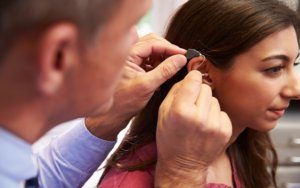 Presented at the American Psychological Association’s 123rd Annual convention, hearing loss in adults is under treated even though hearing aids have been shown to aid in depression and anxiety and improve cognitive function.
Presented at the American Psychological Association’s 123rd Annual convention, hearing loss in adults is under treated even though hearing aids have been shown to aid in depression and anxiety and improve cognitive function.
The National Institute on Deafness and Other Communication Disorders reports that among those over 70 years of age, the use of hearing aids is limited, and only one-in-three senior adults actually uses these helpful devices.
Advertisement
Hearing loss does not just affect a person’s ability to hear, it can also lead to social rejection, isolation, irritability, diminished psychological and overall health, this according to the Better Hearing Institute.
The presentation revealed that among 2,304 individuals with hearing loss, who were studied as part of the National Council on Aging, those who did not wear a hearing aid were 50 percent more likely to suffer from depression or sadness in comparison to those who did wear a hearing aid. Individuals who wear a hearing aid are more likely to partake in social events as well.
“Anger, frustration, depression and anxiety are all common among people who find themselves hard of hearing,” said David Myers, a professor and someone who suffers from hearing loss. “Getting people to use the latest in hearing aid technology can help them regain control of their life, and achieve emotional stability and even better cognitive functioning.”
Myers noted a previous study found in the Archives of Neurology that indicated hearing loss could increase a person’s risk for dementia. The findings from the study revealed that those who suffer from a sensory impairment are more prone to such conditions like dementia. Isolation can contribute to this risk as those with hearing loss tend to isolate themselves or feel isolated from society.
Myers notes of a technology called the hearing loop. It works similar to Wi-Fi and uses inductive loops sent to the hearing aid or cochlear implant to transmit sound signals. Hearing loop amplifiers can work on devices such as TVs, be installed in taxi cabs and even theatres.
Currently hearing loops are popular in Great Britain and Scandinavia but are not widespread in America. Because of advocacy from Myers, 500 hearing loops have been installed in Michigan so far. Myers also supported Hearing Loss of Americas efforts to have hearing loops in Arizona, California, Colorado, Florida, Minnesota, New Mexico, Utah, Washington and New York taxi cabs.
Advertisement
“Making public spaces directly hearing aid accessible is psychologically important for people with hearing loss,” said Myers.
The conference took place in Toronto, Canada.
Sources:
http://www.nidcd.nih.gov/health/statistics/pages/quick.aspx
http://www.apa.org/news/press/releases/2015/08/hearing-loss.aspx
http://www.betterhearing.org/hearingpedia/consequences-hearing-loss
